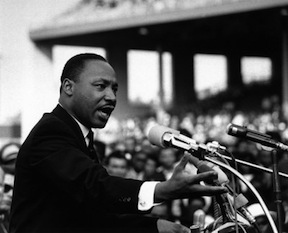 The drum major instinct is a desire in all of us to be important, to be recognized, to be first, to be #1, to lead the parade, to be out front.
The drum major instinct is a desire in all of us to be important, to be recognized, to be first, to be #1, to lead the parade, to be out front.
On February 4, 1968, Dr. Martin Luther King, Jr. delivered a sermon in Atlanta where he spoke on the drum major instinct: “This quest for recognition, this desire for attention, this desire for distinction is the basic impulse, the basic drive of human life, this drum major instinct.”
Reverend King went on to say, “If this instinct is not harnessed, it becomes very dangerous” and urged that this drive, this basic human need for achievement be focused on helping others, on making the world a better place.
Reverend King’s concluding words are quoted in part on the recently unveiled King Memorial in Washington, D.C.: “Yes, if you want to say that I was a drum major, say that I was a drum major for justice. (Amen) Say that I was a drum major for peace. (Yes) I was a drum major for righteousness.” (Words in parentheses are the congregation’s responses to Dr. King.)
Our lives are what we make of them. There is no nobler legacy than to leave the world better for our having lived.
P.S.: The King quotation on the memorial is truncated, presumably in an attempt at brevity, “I was a drum major for justice, peace and righteousness.” Obviously, much of the impact of the statement is lost and, indeed, dropping the “If” at the beginning gives the quote a self-aggrandizing aspect that King surely did not intend. (See Washington Post columnist Rachel Manteuffel, published August 25, 2011, “Martin Luther King a drum major? If you say so.”)


0 Comments